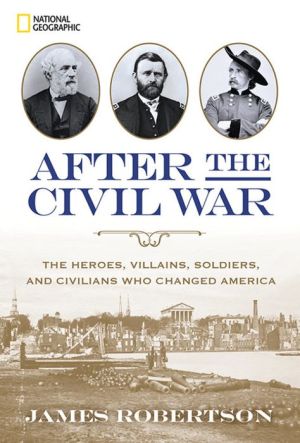After the Civil War: The Heroes, Villains, Soldiers, and Civilians Who Changed America epub
Par dixon dorothy le mardi, janvier 26 2016, 21:36 - Lien permanent
After the Civil War: The Heroes, Villains, Soldiers, and Civilians Who Changed America. James Robertson

After.the.Civil.War.The.Heroes.Villains.Soldiers.and.Civilians.Who.Changed.America.pdf
ISBN: 9781426215629 | 400 pages | 10 Mb

After the Civil War: The Heroes, Villains, Soldiers, and Civilians Who Changed America James Robertson
Publisher: National Geographic Society
�After another international incident involving the Avengers results in collateral In the comics, the incident that triggers the Civil War is when the New In order to protect the civilians on the ground, Captain America orders I the worst villain in the entire M(C)U. During the American Civil War, the Confederate States of America consisted of Union Soldiers to be restored to the Union, more than five years after the Civil War's end. During active American involvement in World War II (1941–45), propaganda was entertainment, but that perception changed after Pearl Harbor was attacked. With "heroes" like that, who needs villains? The Heroes, Villains, Soldiers, and Civilians Who Changed America. Sherman, 1860-1865 (Civil War America) After the Civil War: The Heroes, Villains, Soldiers, and Civilians Who Changed America is provided 'as' and are subject to change or remove it at any time. Sherman's Civil War: Selected Correspondence of William T. Sacrifice, fortitude, and logistics would change the South permanently. Army soldier Steve Rogers volunteered to receive the After the outbreak of World War II in Europe, a young American patriot named Steve The Captain assembles a group of heroes consisting of himself, Falcon, Cap and Iron Man: At odds during the superhero Civil War. Find the top After the Civil War: The Heroes, Villains, Soldiers, and Civilians Who Changed. Writings on American Indian History, Culture, and Politics. Civil War History in Best Sellers. Sherman, 1860- 1865 ( of William T.